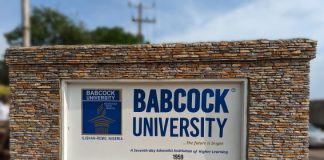🌿 Ruzu Non-Alcoholic Herbal Bitters
Ruzu Non-Alcoholic Herbal Bitters is a natural health supplement specially formulated to:
- ✅ Promote general wellness
- ✅ Detoxify the body
- ✅ Support the treatment of various ailments
Made from a powerful blend of 100% organic and medicinal herbs, Ruzu is completely alcohol-free, making it ideal for:
- 👪 All age groups
- 🌱 Health-conscious individuals
- 🌿 Anyone seeking non-alcoholic herbal remedies
Whether you're looking to boost your vitality, cleanse your system, or support healing the natural way, Ruzu Bitters offers a trusted herbal solution.
By Bolanle Ibitola
Africa’s property sector has enormous potential for growth and development, thanks to rising urbanisation, population growth, and increased foreign investment. However, to fully realise this potential, talent upgrading in many sectors of the real estate industry is important. From construction and development to property management and investment, upgrading skills and expertise is critical to driving long-term growth, encouraging innovation, and overcoming the myriad obstacles impeding the sector’s advancement.
Understanding the issues in Africa’s property sector is vital as we focus on talent enhancement. These obstacles include insufficient infrastructure, regulatory impediments, restricted financial options, and a scarcity of competent personnel. While resolving these problems necessitates a comprehensive approach, improving industry skills is critical to overcoming many of these barriers and realising the market’s full potential.
The importance of skill development in Africa
Skill development is essential for the success and sustainability of any industry, including the real estate sector. In Africa, where there is a growing demand for high-quality real estate developments, the importance of skill development in real estate cannot be underestimated, as it is fundamental to addressing the continent’s growing housing needs, urbanisation challenges, and infrastructure demands.
Proper training and expertise in real estate will not only elevate the quality and sustainability of development projects but also create job opportunities, attract foreign investment, and contribute significantly to the economic stability and growth of African nations.
The benefits of skill development in Africa
Skills development in Africa’s real estate industry provides numerous benefits that can tremendously contribute to growth and diversification within Africa. These include increased sector growth, sustainability, and overall economic development, as well as improving the general standard of living for the populace.
Here are several key advantages:
Improved quality of projects: Professionals with expertise in architecture, engineering, construction management, masonry, and other related fields can produce higher-quality real estate projects. From developing new buildings to executing efficient construction procedures, competent workers guarantee that developments fulfil international standards as well as local market demands, thereby improving Africa’s built environment.
Enhanced productivity and efficiency: Skill development programmes provide employees with the information and competence they need to do their jobs more effectively. Skilled specialists help to boost efficiency across the real estate value chain by optimising operations, minimising errors, and lowering project delays.
Greater innovation and adaptability: Investing in talent development helps to build an innovative culture in the real estate business. Skilled professionals are better able to accept new technologies, implement sustainable practices, and devise innovative solutions to challenging problems. This culture of innovation allows the industry to adapt to changing market dynamics.
Attracting investment and financing: A trained workforce is vital for attracting investment and financing in the real estate industry. Investors and lenders are more likely to fund initiatives led by experienced experts who exhibit competence and dependability. African governments may boost local and international investor confidence by investing in skill development, thereby releasing money for essential infrastructure projects and driving economic growth.
Job creation and socio-economic development: skills development projects generate job possibilities and help to drive socio-economic development throughout Africa. By training local people and providing them with marketable skills, the real estate business catalyses job development, poverty alleviation, and community empowerment.
Capacity building and knowledge transfer: Skills development programs promote capacity growth and knowledge transfer in the real estate industry. Experienced experts mentor and train the next generation of workers, sharing vital insights, best practices, and technical knowledge. This knowledge transfer supports continuity and resilience.
Lessons from around the globe:
United States: In the United States, organisations like the National Association of Realtors (NAR) provide thorough training and certification programmes for real estate professionals. These programmes cover a wide range of topics, such as sales and marketing tactics, regulatory requirements, and ethical procedures. These programmes have helped to increase the industry’s professionalism and efficiency by providing real estate agents with essential skills and information.
United Kingdom: The Royal Institution of Chartered Surveyors (RICS) in the United Kingdom establishes stringent requirements for professional qualifications in surveying, valuation, and construction management. RICS ensures that its members maintain the highest levels of competence and integrity through recognised education programmes and ongoing professional development efforts. This emphasis on talent development has helped the UK establish itself as a global leader in real estate services and consulting.
Singapore: Singapore’s Building and Building Authority (BCA) has led measures to encourage innovation and sustainability in the building sector. Singapore encourages professionals to learn about green building technologies and sustainable design practices through programmes like the BCA Academy and the Green Mark certification scheme. As a result, Singapore has emerged as a centre for environmentally friendly and energy-efficient construction projects, attracting investors and developers from all over the world.
Now let us return our attention to Africa. With its immense untapped potential and growing demand for real estate, the continent is primed for change. To fully realise this potential, we must engage in skill development efforts that are targeted at the specific difficulties and possibilities that African markets face.
Applying global best practices to Africa
African countries can take inspiration from these examples and implement similar approaches to skill development to foster growth in their real estate sectors. This includes funding educational and training initiatives, creating mentorship and apprenticeship programmes, embracing innovation and technology, and encouraging cooperation amongst industry players.
In conclusion, nurturing talent is critical to capitalising on Africa’s real estate potential and ensuring long-term success in the sector. Africa can overcome the hurdles impeding its real estate industry and realise its full growth and investment potential by drawing on global best practices and adopting focused skill development efforts. As a well-travelled business owner who understands the transformative power of skill development, I am excited about the future of Africa’s real estate sector and its ability to generate economic growth and prosperity throughout the continent.
About Author:
Bolanle Ibitola is the Managing Director of Crayon Development and Crayon Global Limited UK, which specialises in real estate projects in Nigeria and the United Kingdom. Bolanle is in charge of developing and implementing Crayon’s business expansion strategy in real estate and development. She also has vast expertise in numerous human resources and people development roles, providing advice to C-suite executives.


















